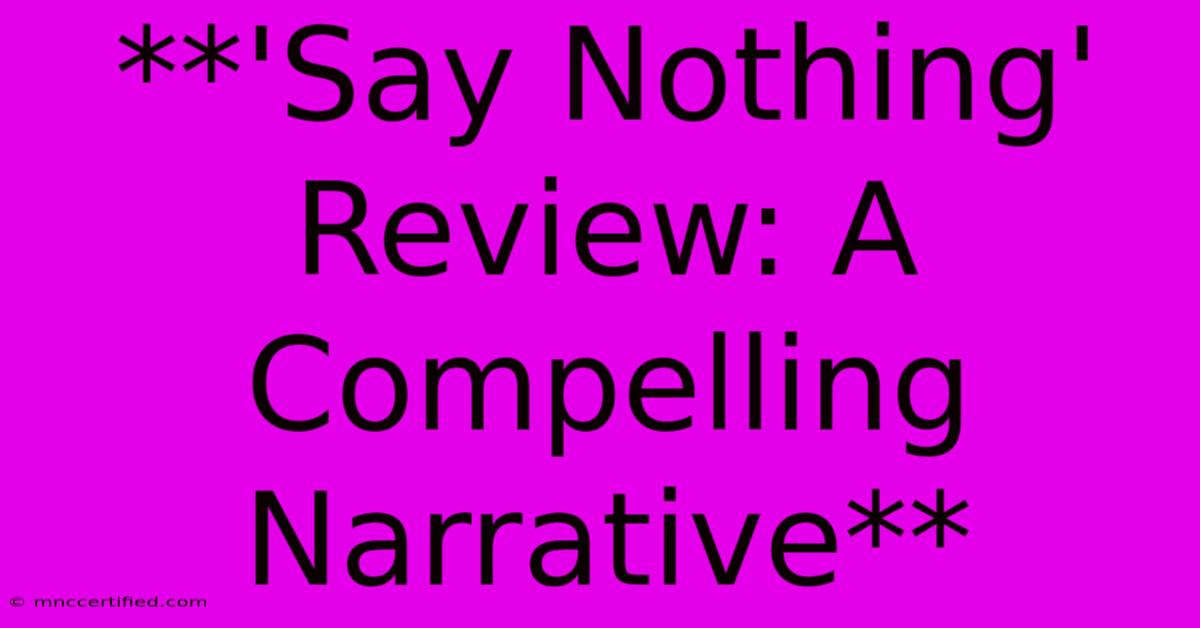**'Say Nothing' Review: A Compelling Narrative**

Table of Contents
'Say Nothing' Review: A Compelling Narrative of the Troubles
Pádraig Ó Tuama's Say Nothing: A True Story of Murder and Memory in Northern Ireland isn't just a book; it's a meticulously crafted tapestry woven from threads of individual lives irrevocably entangled in the brutal conflict known as The Troubles. This isn't your typical historical account; instead, Ó Tuama masterfully braids together personal narratives, historical context, and poetic reflection to deliver a truly compelling narrative that resonates long after the final page is turned.
A Deep Dive into the Disappearance of Jean McConville
The core of the narrative revolves around the disappearance of Jean McConville, a widowed mother of ten, abducted and murdered by the Provisional IRA in 1972. Ó Tuama doesn't shy away from the grim realities of this event, presenting a detailed, yet sensitive, account of her life and the circumstances leading to her tragic end. This focus on a specific individual, rather than a broad overview of the conflict, allows for a deeply empathetic understanding of the human cost of violence. The book isn't just about the murder of Jean McConville, it's about the ripple effect of her disappearance on her family and the wider community.
Beyond the Headlines: Humanizing the Victims
One of the most significant strengths of Say Nothing is its ability to humanize the victims of The Troubles. Ó Tuama avoids simplistic narratives of good versus evil, instead portraying the individuals involved—both perpetrators and victims—as complex people caught in an incredibly difficult and volatile situation. He delves into their personal histories, exploring their motivations and the societal factors that contributed to the violence. This nuanced approach is crucial in understanding the complexities of the conflict and its lasting impact. This humanizing approach helps readers connect emotionally with the story on a much deeper level.
The Power of Oral History and Poetic Prose
Ó Tuama’s skill as a poet is evident throughout the book. His prose is both lyrical and precise, allowing him to convey both the emotional weight of the events and the intricate details of the historical context. The use of oral history, incorporating interviews and personal accounts from those involved, adds another layer of authenticity and intimacy to the narrative. This technique allows the voices of the individuals affected to be heard, creating a powerful and immersive reading experience.
Masterful Weaving of Personal and Political Narratives
The author expertly weaves together the personal story of Jean McConville with the broader political context of The Troubles. He expertly explains the historical background, making the book accessible to readers unfamiliar with the conflict while offering deeper insights for those already knowledgeable. This masterful balancing act prevents the narrative from becoming overly academic or emotionally detached. The intertwining of personal and political narratives is what truly makes Say Nothing stand out.
Why You Should Read 'Say Nothing'
Say Nothing is more than just a historical account; it's a powerful meditation on memory, forgiveness, and the enduring legacy of conflict. It’s a must-read for anyone interested in understanding the complexities of The Troubles, the impact of political violence on individuals and communities, and the enduring power of storytelling to illuminate the human experience. It’s a compelling read, leaving a lasting impact on the reader long after finishing the book. The book is a testament to the enduring power of human stories to illuminate dark corners of history.
Off-Page SEO Considerations:
To further boost the ranking of this article, consider the following off-page SEO strategies:
- Guest Blogging: Write similar content focusing on historical narratives and Irish history for other relevant blogs and websites.
- Social Media Promotion: Share excerpts and reviews on relevant social media platforms, engaging with comments and discussions.
- Backlinks: Reach out to book review websites and history blogs to encourage them to link back to your article.
- Community Engagement: Participate in online forums and communities related to Irish history and The Troubles, subtly referencing your article when appropriate.
By implementing these on-page and off-page SEO strategies, you can significantly improve the visibility and ranking of this article about Pádraig Ó Tuama's compelling book, Say Nothing. Remember, consistent effort in both on-page optimization and off-page promotion is key to achieving high search engine rankings.

Thank you for visiting our website wich cover about **'Say Nothing' Review: A Compelling Narrative**. We hope the information provided has been useful to you. Feel free to contact us if you have any questions or need further assistance. See you next time and dont miss to bookmark.
Featured Posts
-
Week 10 Preview Commanders Vs Eagles
Nov 15, 2024
-
Dogelon Mars Price Prediction 2035
Nov 15, 2024
-
Mike Tyson Vs Jake Paul Uk Fight Time And How To Watch
Nov 15, 2024
-
Harry Potter Trading Card Game List
Nov 15, 2024
-
Composite Bonding Before And After
Nov 15, 2024